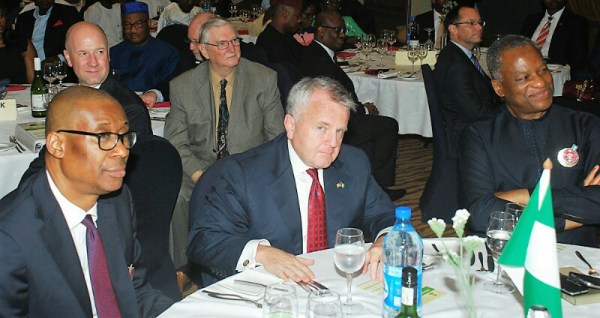
Nigerians must use the hard lessons of the recent economic recession to build a sustainable economy based on diversification away from oil and the oil curse.
The Minister of Industry, Trade and Investment, Okechukwu Enelamah, gave this advice on Monday at a business dinner in honour of the U.S. Deputy Secretary of State, John Sullivan.
The dinner was attended by participants in the just-ended Nigeria-U.S. Bi-National Commission meeting in Abuja.
Nigeria’s economy slipped into recession in the first quarter of 2016, after consecutive contractions following falling global crude oil prices.
To guard against recurrence of the experience, Enelamah said government launched the medium-term economic recovery and growth plan, ERGP, to pursue purposeful economic growth, invest in the people and build a competitive economy.
He said the government appreciated the strategic importance of agriculture, an area Nigeria has comparative advantage in terms of arable land and a huge population.
Besides, he said, government recognised the need for infrastructure development, through the provision of power, energy, transportation and rail lines, apart from an inclusive industrialization, linked to micro, small and medium enterprises.

“We need to create the environment that entrepreneurship and enterprise can thrive. The ERGP includes the social sectors, in terms of education, healthcare, and technology to launch the country into the 21st century,” he said.
“The ERGP is not an ambitious document. This was deliberate. It is a document forged at a time of a recession and tough economic times. One of the real regrets for me, as a Nigerian, and as a member of this administration, will be if we waste this crisis, particularly the difficult times the country has been through.
“In trying to exit recession, we should not be in a hurry, but do so in a way we will learn from the lessons and apply for a long time, to build a sustainable economy that promotes diversification away from oil and the oil curse,” he said.
The minister said President Muhammadu Buhari’s agenda included providing security, fighting corruption and creating the right environment for business, through transparency, good governance, wealth creation and economic prosperity.
He hailed the ERGP as not only clear, but also focused and consistent with the president’s vision for sustainable economic growth, without over-promising and under delivering priorities.
The ERGP priorities, he pointed out, were similar to the Nigeria-U.S. Bi-national commission vision and agenda to pursue government priorities through a commitment to create an enabling environment for doing business.
He commended the United States for consistently encouraging Nigeria to create an enabling business environment for industries to thrive and the economy to grow.
“If the huddles to creating the environment to do business are removed, the people will do well. That’s why Nigerians excel when they go abroad. There is something in the environment we need to get right to bring out the best in the people.
“Nigeria is the right place to do business. Government wants to attract people who want to do business the right way. Our vision is to make Nigeria one of the most attractive and easiest place to do business in Africa,” he said.
He noted the activities of the Presidential Industrial Policy and Competitiveness Advisory Council established to provide the forum for government and the private sector to work together to implement the ERGP and find solutions to the country’s economic problems.
The council, he said, focuses on critical areas, namely industry, critical infrastructure, financing, policy and regulation, vocational training and skills acquisition, trade and market access.
The Executive Secretary, Nigerian Investment Promotion Commission, NIPC, Yewande Sadiku, said the US-Nigeria bi-national Commission began in 2016 under the Obama administration to enable the two countries cooperate and collaborate on issues of common development interest.
Mrs. Sadiku said the Commission has provided a platform for government and private sector players to interact and find solutions to problems limiting ease of doing business, to promote investment opportunities.
“No government anywhere in the world can build its infrastructural requirements by itself. Government (federal or state) must work with domestic and international investors in the private sector to deliver service to the people.
“We will leverage on areas the U.S is strong at, particularly in agriculture, power, construction and real estate, manufacturing, solid minerals, digital economy, service,” she said.
The Nigeria-U.S. Bi-national Commission was hosted by the NIPC and the Federal Ministry of Industry, Trade and Investment (MITI), in partnership with the U.S. Department of Commerce and the American Business Council
Participants included the Assistant Secretary of the State, Department of Commerce, Skip Jones; U.S. Ambassador to Nigeria, Stuart Symington, and the Consular- General, John Bray.
Others were Nigerian Minister of Foreign Affairs, Geoffrey Onyeama; President, American Business Council and Managing Director of General E, Lazarus Angbazo, and CEO, American Business Council in Nigeria, Margaret Olele.
Copyright Ships & Ports Ltd. Permission to use quotations from this article is granted subject to appropriate credit given to www.shipsandports.com.ng as the source.